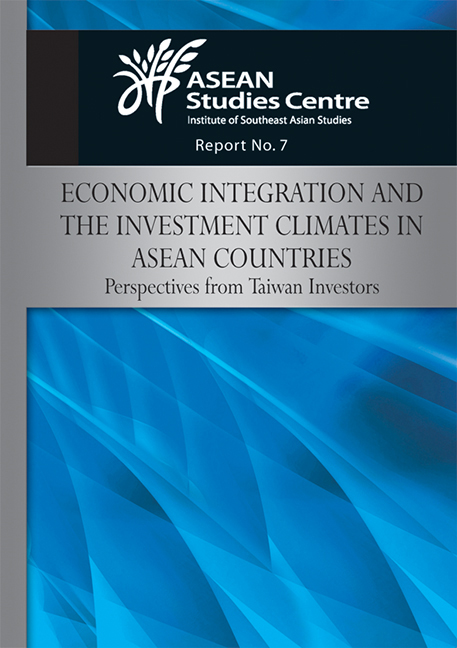 Economic Integration and the Investment Climates in ASEAN Countries
Economic Integration and the Investment Climates in ASEAN Countries Book contents
- Frontmatter
- Contents
- Introduction
- I Economic Integration and the Investment Climates in ASEAN Countries: Perspectives from Taiwan Investors
- II Background Papers
- 1 Taiwan and ASEAN Economic Interaction: Prospects and Opportunities
- 2 Taishang: A Different Kind of Ethnic Chinese Business in Southeast Asia
- 3 ASEAN Economic Integration and Taiwan
- 4 ASEAN's Bilateral Free Trade Agreements: Benefits and Challenges for the Region
- Annex I: Programme of the Symposium
2 - Taishang: A Different Kind of Ethnic Chinese Business in Southeast Asia
from II - Background Papers
Published online by Cambridge University Press: 21 October 2015
- Frontmatter
- Contents
- Introduction
- I Economic Integration and the Investment Climates in ASEAN Countries: Perspectives from Taiwan Investors
- II Background Papers
- 1 Taiwan and ASEAN Economic Interaction: Prospects and Opportunities
- 2 Taishang: A Different Kind of Ethnic Chinese Business in Southeast Asia
- 3 ASEAN Economic Integration and Taiwan
- 4 ASEAN's Bilateral Free Trade Agreements: Benefits and Challenges for the Region
- Annex I: Programme of the Symposium
Summary
Introduction
Taiwanese transnational capital emerged in the mid-1980s, and its importance is now widely recognized by Taiwanese scholars in various disciplines. There has been an increasing interest to investigate the nature of this newly emerging transnational capital, which is considered to be different from the Western or Japanese ones. Studies of Taiwanese businesses (Taishang) in Southeast Asia have concentrated on the domains of overseas investment patterns (Chen 1994, 1998; Lin 2001), industrial relations (Kung 2002; Wang 2002), and ethnic relations and overseas Chinese networks (Hsiao and Kung 1998; Tseng 1999). Some scholars have noted that, to Taishang, Southeast Asia is not only a geographical area, but also a cultural entity, and thus their investment behaviour as a whole is embedded in the social contexts of the region. As latecomers to transnational capital in Southeast Asia, the Taishang demonstrates some distinguishing features.
This paper argues that the Taishang phenomenon in Southeast Asia should be understood first in terms of its capital formation and special characteristics, and second in terms of the influences of the political economy of the host countries. The paper tackles the issue of how the Taishang have globalized their capital and business strategies to maintain their competitiveness in the world economy. It also explains how the Taishang have reorganized their industrial production networks and how they manage labour relations in Southeast Asia.
- Type
- Chapter
- Information
- Economic Integration and the Investment Climates in ASEAN CountriesPerspectives from Taiwan Investors, pp. 48 - 74Publisher: ISEAS–Yusof Ishak InstitutePrint publication year: 2009


